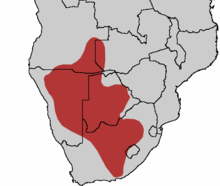Eastern clapper lark
| Eastern clapper lark | |
|---|---|
 |
|
| M. f. subsp. fasciolata at Tswalu Kalahari Reserve, South Africa | |
|
Not recognized (IUCN 3.1)
|
|
| Scientific classification | |
| Kingdom: | Animalia |
| Phylum: | Chordata |
| Class: | Aves |
| Order: | Passeriformes |
| Family: | Alaudidae |
| Genus: | Mirafra |
| Species: | M. fasciolata |
| Binomial name | |
|
Mirafra fasciolata (Sundevall, 1850) |
|
| Subspecies | |
|
see text |
|
 |
|
| resident range | |
| Synonyms | |
|
|
see text
The eastern clapper lark (Mirafra fasciolata) is a small passerine bird which breeds in southern Africa. It derives its name from the wing clapping which forms part of its display flight.
The Eastern clapper lark was originally placed in the genus Alauda. This species and the Cape clapper lark were formerly considered conspecific as the clapper lark (M. apiata) until split in 2009. The Eastern clapper lark and the Cape clapper lark are regarded as forming a superspecies with the flappet lark, which is found further to the north.Damara clapper lark is an alternate name for the Cape clapper lark.
Five subspecies are recognized:
This lark is a 15-cm-long bird, with a brown crown, rich rufous underparts, and a strong bill. It has brown upperparts (greyer in the north of its range). Its call is an ascending "pooooeeeee".
The eastern clapper lark is found in much of the drier parts of southern Africa in Zambia, Namibia, Botswana, Lesotho and South Africa. It is a species of open grassland and savannah.
The eastern clapper lark is a skulking species, difficult to find when not displaying. It is not gregarious, and individuals tend to be seen in dry habitats feeding on the ground on seeds and insects. The display commences with an ascending flight with wing flapping. It then parachutes down with trailing legs.
...
Wikipedia
